
ACTA SOCIETATIS BOTANICORUM POLONIAE
Scope & Guideline
Innovating the Future of Plant Ecology and Conservation
Introduction
Aims and Scopes
- Plant Taxonomy and Systematics:
The journal publishes research on the classification and identification of plant species, including phylogenetic analyses and micromorphological studies, contributing significantly to the understanding of plant diversity. - Ecological and Environmental Studies:
Research addressing plant responses to ecological factors, including climate change, habitat alterations, and biodiversity assessments, is a core focus, emphasizing the ecological significance of plant species. - Genetic and Molecular Studies:
The journal emphasizes genetic mapping, genome analysis, and studies on gene expression related to plant traits, providing insights into plant genetics and biotechnology. - Ethnobotany and Traditional Knowledge:
Papers exploring the use of plants in traditional practices and their cultural significance reflect the journal's commitment to integrating scientific research with local knowledge systems. - Conservation and Biodiversity:
Research on endangered species, habitat conservation, and the impact of human activities on plant populations highlights the journal's role in promoting plant conservation efforts. - Biotechnological Applications:
The journal features studies on in vitro culture, somatic embryogenesis, and other biotechnological approaches aimed at improving plant breeding and conservation.
Trending and Emerging
- Genomics and Genetic Mapping:
Recent publications indicate a growing trend in genomic studies, including genetic mapping and analysis of specific genes related to agronomic traits, signaling a shift towards molecular biology in plant research. - Plant Responses to Climate Change:
There is an increasing emphasis on understanding how plants adapt to changing environmental conditions, particularly in the context of climate change, which is crucial for conservation and agricultural practices. - Ethnobotanical Research:
A notable rise in ethnobotanical studies reflects a broader interest in the relationship between plants and cultural practices, emphasizing the importance of traditional knowledge in biodiversity conservation. - In Vitro and Biotechnological Techniques:
The application of biotechnological methods, including in vitro culture and genetic manipulation, has gained momentum, indicating a trend towards innovative approaches in plant breeding and conservation. - Functional Ecology:
Research focusing on ecological functions and interactions among plant species, such as their roles in ecosystems and responses to abiotic stress, is becoming increasingly prominent, highlighting the importance of ecological dynamics.
Declining or Waning
- Palaeobotany:
Research related to palaeobotany, although significant historically, has seen a decrease in the number of publications, possibly due to a shift towards more contemporary ecological and genetic studies. - Historical Botanical Studies:
The focus on historical perspectives in botany, such as studies on herbarium collections and historical botanical contributions, has become less frequent, reflecting a greater interest in current and applied research. - Taxonomic Revision of Common Species:
While taxonomic studies remain important, there has been a noticeable decline in papers exclusively revising common or well-documented species, as researchers increasingly focus on lesser-known or endangered taxa.
Similar Journals
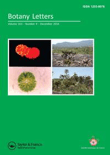
Botany Letters
Exploring New Frontiers in Botany for a Sustainable FutureBotany Letters, published by Taylor & Francis Ltd, is a prominent journal in the field of Plant Science based in the United Kingdom. With its ISSN 2381-8107 and E-ISSN 2381-8115, the journal has established itself as an essential resource for researchers, professionals, and students alike, focusing on innovative studies and findings in botany. As a Q2 ranked journal in its category (2023) and holding a respectable Scopus rank of #200 out of 516 in Agricultural and Biological Sciences, it reflects a robust commitment to quality and relevance in the field. The journal's open access model ensures that groundbreaking research is readily accessible, fostering collaboration and knowledge sharing among the global scientific community. Covering a broad spectrum of topics within plant science from 2016, Botany Letters aims to catalyze advancements in the understanding and management of plant biodiversity and sustainability, ultimately contributing to conservation efforts and agricultural innovation.

NORDIC JOURNAL OF BOTANY
Nurturing Collaboration in Botanical ResearchNORDIC JOURNAL OF BOTANY, published by WILEY, is a distinguished journal that serves as a vital platform for the dissemination of innovative research in the fields of Plant Science and Ecology, Evolution, Behavior and Systematics. With an ISSN of 0107-055X and E-ISSN 1756-1051, this journal has been a crucial part of the academic landscape since its inception in 1981, continuing to contribute significantly to the literature up to 2024. NORDIC JOURNAL OF BOTANY holds a commendable Q2 ranking in Plant Science and Q3 in Ecology, which underscores its impact and relevance in the scientific community. Despite the absence of Open Access options, the journal offers robust access features that ensure researchers and readers can easily engage with its meticulously curated content. Aimed at both seasoned professionals and emerging scholars, the journal not only publishes high-quality articles but also fosters collaboration and knowledge exchange across various related disciplines, thereby solidifying its role as a cornerstone in botanical and ecological research.
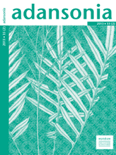
ADANSONIA
Advancing plant science through open dialogue.ADANSONIA is a distinguished, peer-reviewed open access journal dedicated to advancing the field of plant science. Published by the Publications Scientifiques du Museum in Paris since 2000, this journal serves as a critical platform for sharing innovative research and discoveries in botany, ecology, and related disciplines. With its ISSN 1280-8571 and E-ISSN 1639-4798, ADANSONIA boasts a notable Scopus rank of #383 in the Agricultural and Biological Sciences category and a 2023 category quartile ranking of Q3 in Plant Science, indicating a meaningful contribution to the academic community. The journal's scope encompasses a broad range of topics, making it a vital resource for researchers, professionals, and students alike who are exploring the complexities of plant biology. Based in France, ADANSONIA not only enhances visibility for groundbreaking research but also facilitates open communication amongst scholars, ensuring that knowledge on plant science is accessible worldwide. Located at CP 39-57, Rue Cuvier, F-75231 Paris Cedex 05, France, this journal stands as a testament to the collaborative efforts in the pursuit of scientific excellence in plant sciences.
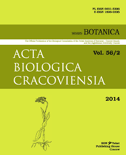
ACTA BIOLOGICA CRACOVIENSIA SERIES BOTANICA
Exploring biodiversity and conservation in every issue.ACTA BIOLOGICA CRACOVIENSIA SERIES BOTANICA is a distinguished journal published by the Polska Akademia Nauk (Polish Academy of Sciences), with its roots tracing back to 1996. As a pivotal publication in the field of Plant Science, it serves to disseminate high-quality research and findings, contributing to the ongoing development and understanding of biodiversity, plant ecology, and conservation. The journal is indexed under Scopus, ranked #203 out of 516 in its category, placing it in the 60th percentile and firmly within Q3 quartile for Plant Science in 2023. Researchers, professionals, and students will find invaluable content within its pages, enhancing their knowledge and supporting academic exploration. Although it currently does not offer open access options, the journal remains a crucial resource for those engaged in botanical sciences, with a commitment to advancing scholarship in Poland and beyond.
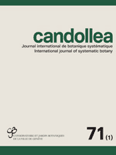
CANDOLLEA
Cultivating Insights in Ecology and Evolution.CANDOLLEA is a distinguished academic journal published by the Conservatoire et Jardin Botaniques Ville Genève, focusing on the fields of Ecology, Evolution, Behavior, Systematics, and Plant Science. With an ISSN of 0373-2967, this journal serves as a vital platform for researchers, professionals, and students aiming to deepen their understanding and contribute to the scientific discourse surrounding botanical research and ecosystem dynamics. Since its convergence in 2000, CANDOLLEA has trodden the path of scholarly excellence, currently residing in the Q3 quartile for both Ecology and Plant Science in 2023. Although it does not currently offer open access, the journal plays a critical role in disseminating valuable findings and innovative methodologies that shape contemporary ecological and botanical studies. The journal is located in Switzerland at CASE POSTALE 60, CH-1292 CHAMBESY, serving as a beacon for scholars dedicated to advancing their expertise in environmental and plant sciences.

TAXON
Pioneering research in systematics and behavior.TAXON is a premier international journal published by Wiley, dedicated to the fields of ecology, evolution, behavior, systematics, and plant science. With a distinguished history since 1970 and a commitment to advancing knowledge in the biological sciences, TAXON has been recognized in the Q1 category for both its ecological and plant science contributions as of 2023. The journal boasts an impressive Scopus ranking, placing it in the 76th percentile for Ecology, Evolution, Behavior and Systematics and the 74th percentile for Plant Science, highlighting its significance and impact within these domains. While not an open-access publication, TAXON offers a wealth of high-quality research articles, reviews, and discussions, making it an indispensable resource for researchers, professionals, and students alike seeking to deepen their understanding of biodiversity and systematics. For access to its cutting-edge research, readers can follow the journal's updates and contributions online.
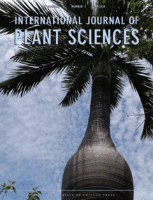
INTERNATIONAL JOURNAL OF PLANT SCIENCES
Exploring the frontiers of plant science and ecology.The INTERNATIONAL JOURNAL OF PLANT SCIENCES, published by UNIV CHICAGO PRESS, is a leading journal dedicated to advancing knowledge in the fields of plant sciences and ecology. With an ISSN of 1058-5893 and an E-ISSN of 1537-5315, this journal has been a prominent platform for groundbreaking research since its establishment, featuring works from 1983 to present. It holds an impressive Q2 ranking in both Ecology, Evolution, Behavior and Systematics and Plant Science, reflecting its reputable standing within the academic community. The journal is well-regarded for its rigorous peer-review process and commitment to high-quality publication standards, making it a favored choice for researchers, students, and professionals eager to engage with the latest findings and innovative methodologies in plant research. While it does not currently operate under an Open Access model, the journal provides ample access options for institutions and individuals keen to explore its curated content. By presenting diverse studies that blend theoretical and practical insights, the INTERNATIONAL JOURNAL OF PLANT SCIENCES plays a critical role in fostering interdisciplinary dialogue and advancing the frontiers of plant science research.
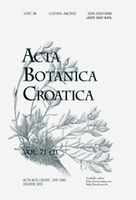
ACTA BOTANICA CROATICA
Fostering Collaboration in Botanical ResearchACTA BOTANICA CROATICA is an esteemed interdisciplinary journal dedicated to the exploration and advancement of botanical sciences, published by UNIV ZAGREB, FAC SCIENCE, DIV BIOLOGY. Since its inception, this journal has embraced an Open Access model, enabling researchers and the global scientific community easy and unrestricted access to cutting-edge findings in plant biology, ecology, and evolutionary studies since 2011. Covering a broad spectrum from plant science to ecological and evolutionary behavior, ACTA BOTANICA CROATICA holds an important position in the academic landscape, currently classified in the Q3 quartile for both Ecology, Evolution, Behavior and Systematics and Plant Science categories. With a robust ranking in Scopus, it stands at #246 out of 516 in Plant Science and #360 out of 721 in Ecology, showcasing its commitment to quality research dissemination. The journal invites contributions from researchers, professionals, and students aiming to broaden the horizons of botanical research and foster collaboration within the scientific community.
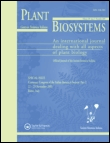
PLANT BIOSYSTEMS
Illuminating the Pathways of Plant Interactions and AdaptationsPLANT BIOSYSTEMS, published by TAYLOR & FRANCIS LTD, is a leading academic journal dedicated to advancing the understanding of plant systems and their ecological interactions. With an ISSN of 1126-3504 and an E-ISSN of 1724-5575, this journal holds a significant place in the fields of Ecology and Plant Science, earning a Q2 rank in both categories as of 2023. Established in 1993 and continuing robustly through to 2024, it aims to provide a platform for pioneering research that encompasses a wide array of topics, from evolutionary biology to plant-environment interactions. Although not an open-access journal, it maintains a strong reputation, backed by its impressive Scopus rankings—positioned at #179 in Ecology, Evolution, Behavior and Systematics and #138 in Plant Science, placing it within the top percentiles. PLANT BIOSYSTEMS is a vital resource for researchers, professionals, and students who are keen to contribute to and learn from cutting-edge findings in the ever-evolving domain of plant sciences.

Botany
Advancing plant science through interdisciplinary insight.Botany is a premier academic journal published by Canadian Science Publishing, dedicated to advancing the understanding of plant sciences and ecological systems. With an ISSN of 1916-2790 and an E-ISSN of 1916-2804, this journal has established itself as a respected publication in the fields of Ecology, Evolution, Behavior and Systematics, and Plant Science, reflected in its 2023 Q2 and Q3 rankings. Covering a wide range of topics, Botany is committed to fostering interdisciplinary research, promoting innovative methodologies, and disseminating significant findings from both theoretical and applied perspectives. Based in Ottawa, Canada, the journal is open access, ensuring that high-quality research is accessible to a global audience, thereby playing a crucial role in the dissemination of knowledge in the scientific community. With convergence years from 2008 to 2024, it continues to evolve alongside the scientific advancements in botanical studies, making it an essential resource for researchers, professionals, and students alike.